CloudFactory vs. Kili Technology: In-Depth Review and Analysis

Struggling with inconsistent, low-quality labeled data that hinders your ML projects? Finding the right data labeling vendor is crucial yet challenging, as it directly impacts the accuracy and performance of your machine learning models.
This article compares two data labeling vendors, CloudFactory and Kili Technology, to help you navigate this critical decision.
CloudFactory vs. Kili Technology: Company Profiles
Feature | CloudFactory | Kili Technology |
Founded | 2010 | 2018 |
Headquarters | Kowloon, China | Paris Île-de-France |
Market Focus |
|
|
CloudFactory Company
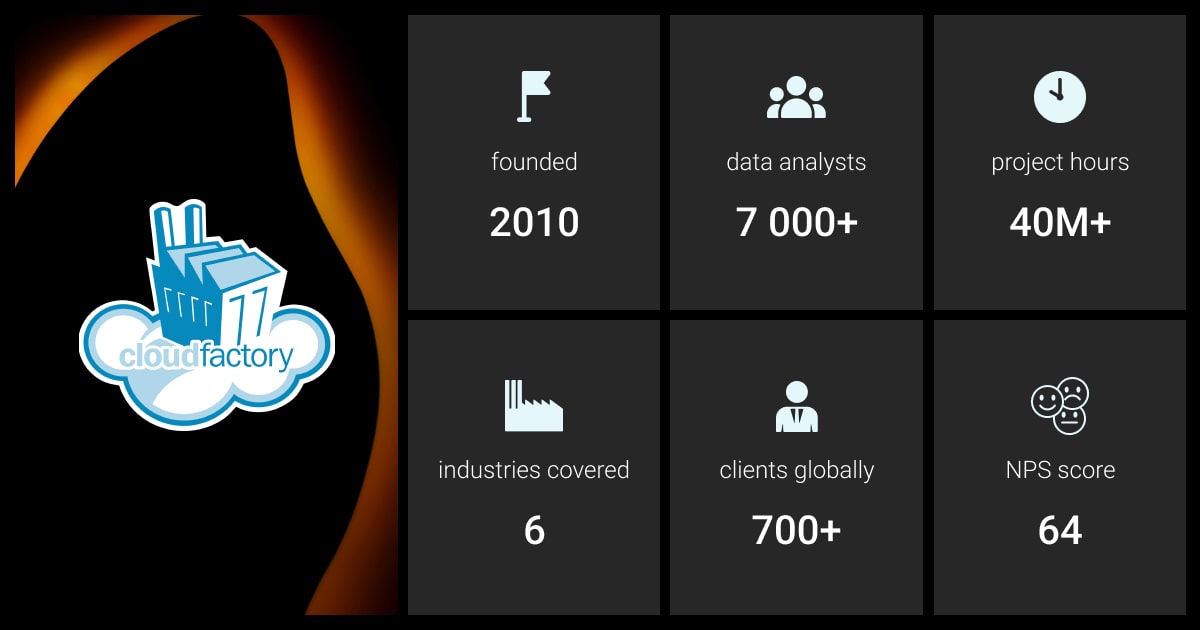
CloudFactory offers human-in-the-loop (HITL) data labeling solutions, leveraging a global, on-demand workforce supported by AI technology. With a talent pool of over 7,000 data annotators, CloudFactory is trusted by more than 700 AI companies. Established in 2010 by Mark Sears, the company has a presence in the UK, US, Nepal, and Kenya. As of 2024, Kevin Johnston has taken on the role of CEO, with Sears transitioning to Executive Chairman.
Kili Technology Company
Kili Technology, founded in 2018 by Edouard d’Archimbaud and François-Xavier Leduc, is a data labeling platform designed for data scientists and engineers. Launched in 2020, it enables efficient labeling of large datasets for ML model training. Kili Technology supports various industries, including healthcare, finance, and retail. Major corporations like L'Oréal, Renault, and Airbus use the platform to improve AI applications such as facial recognition, autonomous driving, and predictive maintenance.
Services and Products
CloudFactory Services and Products
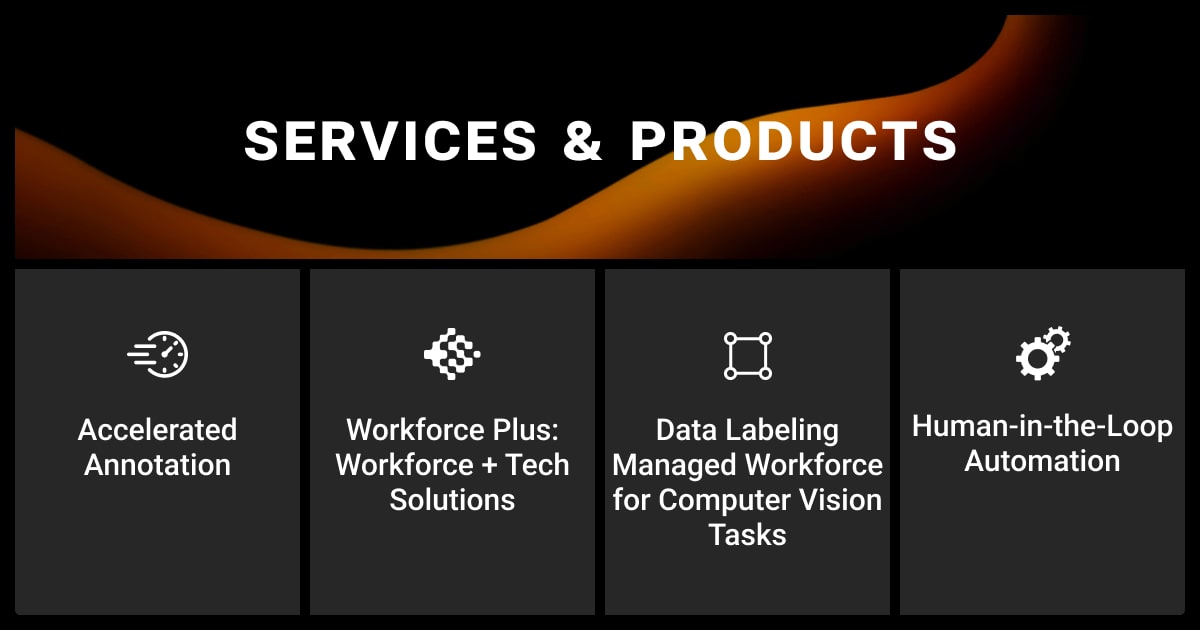
CloudFactory offers a wide range of human-led AI solutions, including data curation, annotation, quality assurance, and model optimization. While CloudFactory specializes mainly in computer vision data annotation, their support for natural language processing (NLP) is more limited, especially for languages other than English. Their key services consist of:
Data Labeling:
Accelerated Annotation: AI-powered labeling for 2D images and videos, up to 30 times faster without sacrificing accuracy.
Workforce Plus (workforce + tech): Comprehensive package for labeling video, LiDAR data, and more, with platform integration options.
Vision AI Managed Workforce: Dedicated workforce trained for computer vision tasks.
NLP: Text and audio data labeling using their platform or yours.
Data Processing: Workforce support for business process optimization and back-office tasks.
Human-in-the-Loop Automation:
Managed Workforce: Skilled workforce complementing AI automation, mainly for computer vision tasks in industries like aerial and geospatial, autonomous vehicles, finance, healthcare, insurance, and retail.
Products:
Hasty: A data-centric ML platform for computer vision applications acquired in 2022. It offers AI-powered image annotation, quality control, and no-code model building.
Kili Technology Services & Products
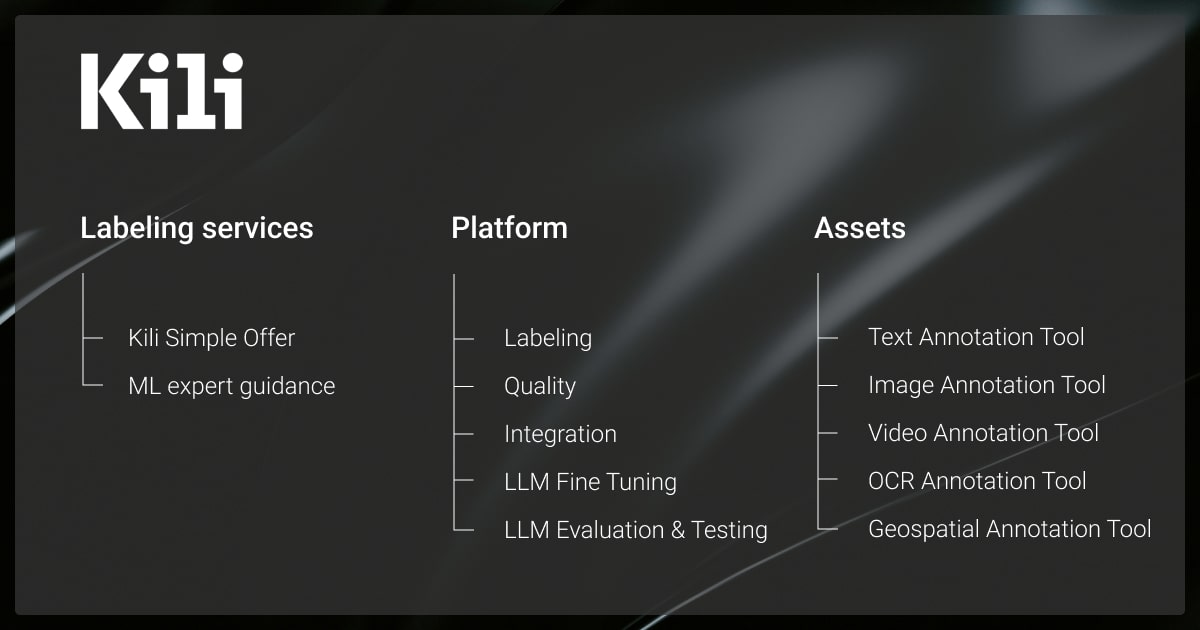
Kili Technology provides comprehensive data labeling solutions to help businesses and data scientists build high-quality machine learning datasets. Their core offerings include a data labeling platform, professional services with a global annotator workforce, and expert guidance from Machine Learning Engineers (MLEs).
Kili Data Labeling Platform:
Supports labeling for text, documents, images, and videos
Offers AI-assisted tools to enhance manual labeling
Key features: labeling tools, quality management, integration capabilities, LLM fine-tuning, evaluation, and testing
Professional Services:
Managed Expert Labeling Service: Expert-led data labeling for high-quality datasets
Kili Simple: Global annotators for large-scale tasks across various formats
ML Expert Guidance: Access to API, quality control, customizable annotation, and real-time project oversight
Professional Services: Consulting by MLEs for project assessment and implementation
Products:
davinci: A generative AI tool for patent drafting and office action response, distinct from similarly named products despite trademark disputes.
Pricing Models
Feature | CloudFactory | Kili Technology |
Pricing Structure | Flexible Plans | Tiered Plans |
Pricing Details |
|
|
Free pilot | No | Yes (available with Free Plan) |
Additional Notes |
|
|
Dataset Types
CloudFactory Dataset Types
CloudFactory services are suitable for both computer vision data and NLP data. The data annotation formats they support include PNG Masks, JSON, and COCO for import, and COCO, Pascal VOC, JSON, and PNG Masks for export.
The types of data the company works with are 2D image and video files, including PNG, JPG, WEBM, HEIC, BMP, tiff for images, and all video types supported by FFmpeg.
Kili Technology Dataset Types
Kili Technology's platform simplifies the annotation of various unstructured data formats, including images, videos, text documents, PDFs, satellite imagery, and conversational data. It offers specialized interfaces and features for efficient and accurate labeling, supporting LLM evaluation, supervised fine-tuning, and RLHF workflows.
Data Transfer and Formats:
Import Formats: CSV, JSON, image files
Export Formats: CSV, JSON, TensorFlow Record
Platform Limitations:
Video Annotation: Supports only bounding boxes
OCR Integration: Requires users to upload their own OCR data for text annotation in images
Supported Formats: Common image formats are accepted, but Excel and Word documents need transformation before import.
Data Annotation Tools
CloudFactory Annotation Tools
CloudFactory provides a versatile platform for data annotation, allowing clients to either use their tools or integrate with existing software. Their data analysts are adaptable, capable of learning custom tools to meet specific ML project requirements, making CloudFactory ideal for scaling up labeling tasks.
Key Features:
Flexibility: Use CloudFactory’s tools or integrate with your own
Tool-Agnostic Analysts: Capable of learning custom tools
Partnerships: Collaborates with data labeling companies like Dataloop, Datasaur.ai, and Labelbox for complementary workforce solutions
Automation Features:
Label assistants
Fully automated labeling
Active learning
AI-consensus scoring
Additional automation features
Kili Technology Annotation Tools
Kili Technology’s platform allows you to interact with pre-labeled data, making necessary adjustments to ensure high-quality labels, even with automation. You can use custom models for pre-labeling, and the platform employs built-in AI models like ChatGPT and SAM to automatically pre-label raw data, saving time for large datasets.
If you prefer the team to use your specific tool, this option is available for an additional fee. With their extensive experience, the specialists can also provide feedback on your tool and suggest any necessary improvements.
Annotation Tools:
Text Annotation Tool
Image Annotation Tool
Video Annotation Tool
OCR Annotation Tool
Geospatial Annotation Tool
Key Features:
Interaction with pre-labeled data for quality adjustments
Custom model integration for pre-labeling
Built-in AI models for automatic pre-labeling
Drawbacks:
Automation features are still under development, requiring human annotators for complex tasks
Focus on proprietary tools may lead to integration challenges with existing labeling tools, potentially hindering a seamless workflow.
Integrations
CloudFactory Integrations
CloudFactory integrates with major cloud storage platforms, including AWS S3, Google Cloud Storage, and Azure Blob Storage, ensuring seamless data transfer. They also support various machine learning frameworks like TensorFlow and PyTorch to streamline model training workflows.
Key Integration Features:
Cloud Storage: AWS S3, Google Cloud Storage, Azure Blob Storage
Machine Learning Frameworks: TensorFlow, PyTorch
REST API: Automates and manages labeling projects and back-office data tasks programmatically
Data Security: Prioritizes secure cloud environments
Data Ownership: Users retain full and exclusive ownership of all uploaded data
These integrations enable developers to connect data jobs to existing applications, enhancing workflow management and efficiency.
Kili Technology Integrations
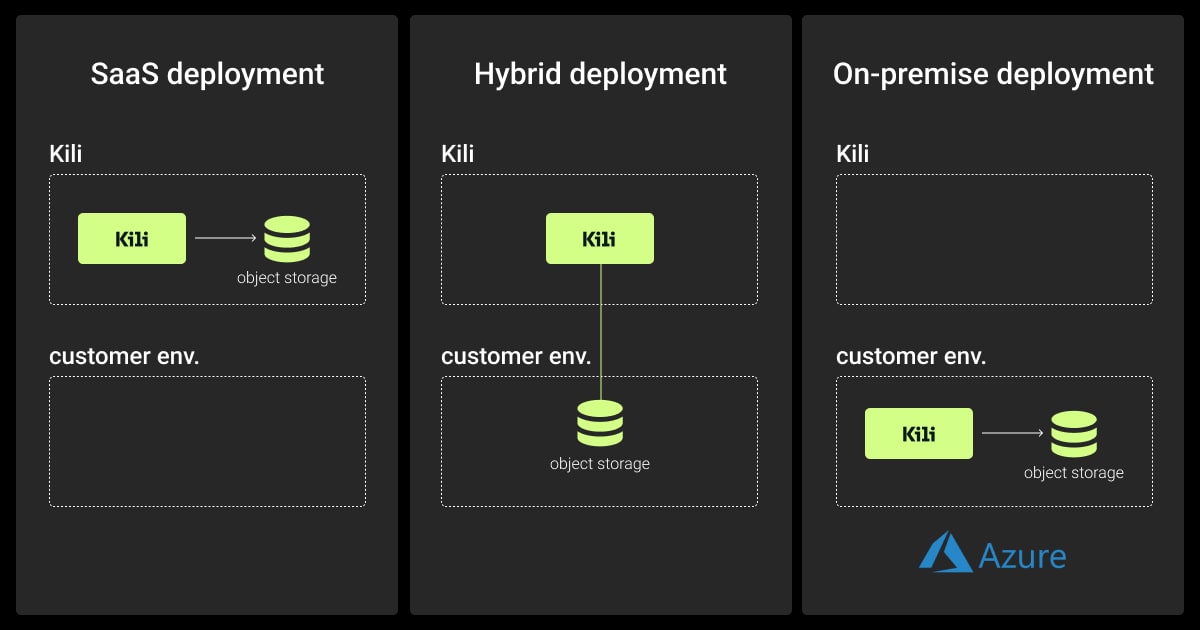
Kili Technology offers a robust suite of tools to manage data quality, enhance collaboration, and integrate seamlessly into existing machine learning workflows.
Integration Tools:
API and Python SDK: Enable programmatic access to core functionalities, allowing users to manage data quality and integrate Kili into ML pipelines.
Data Storage and Cloud Platforms: Supports Amazon S3, Google Cloud Storage, and Microsoft Azure Blob Storage, simplifying data import and export. This allows for direct initiation of labeling tasks without manual data transfer.
Version Control: Facilitates tracking of data changes and export versions in preferred model formats (e.g., YOLO, PASCAL VOC).
Simplified Labeling Operations Management:
Integration with existing ML stacks, datasets, and large language models (LLMs)
Easy import/export of data
Management of labeling projects
Oversight of the entire training data lifecycle within Kili
Key Considerations:
Full functionality requires the use of webhooks, API access, and the Python SDK.
The API might have a steeper learning curve for users without technical expertise.
Annotation Process
CloudFactory Annotation Process
CloudFactory integrates human expertise, established workflows, and advanced technology for data labeling. Here’s an overview:
Pre-Commitment:
Free analysis: Cloudfactory reviews your instructions, tests tasks, and offers feedback. This 10-hour mini pilot labels a sample set and provides a detailed report with recommendations.
Getting Started:
Team Onboarding: A dedicated team is onboarded over two weeks, determining expert needs and recruiting additional workers if necessary. Their global network handles large projects efficiently.
Data Annotation Process:
Data Annotation: The team labels data per your specifications.
Quality Assurance: Rigorous quality checks at every step.
Process Iteration: Continuous monitoring and adjustments to refine workflows and QA procedures. The team size can be scaled as needed.
Project Management: Comprehensive project planning, implementation, and measurement ensure desired outcomes.
Support and Management:
Dedicated Support: Each project has a Client Success Manager, Delivery Team Lead, and Channel Manager for ongoing support.
Kili Technology Annotation Process
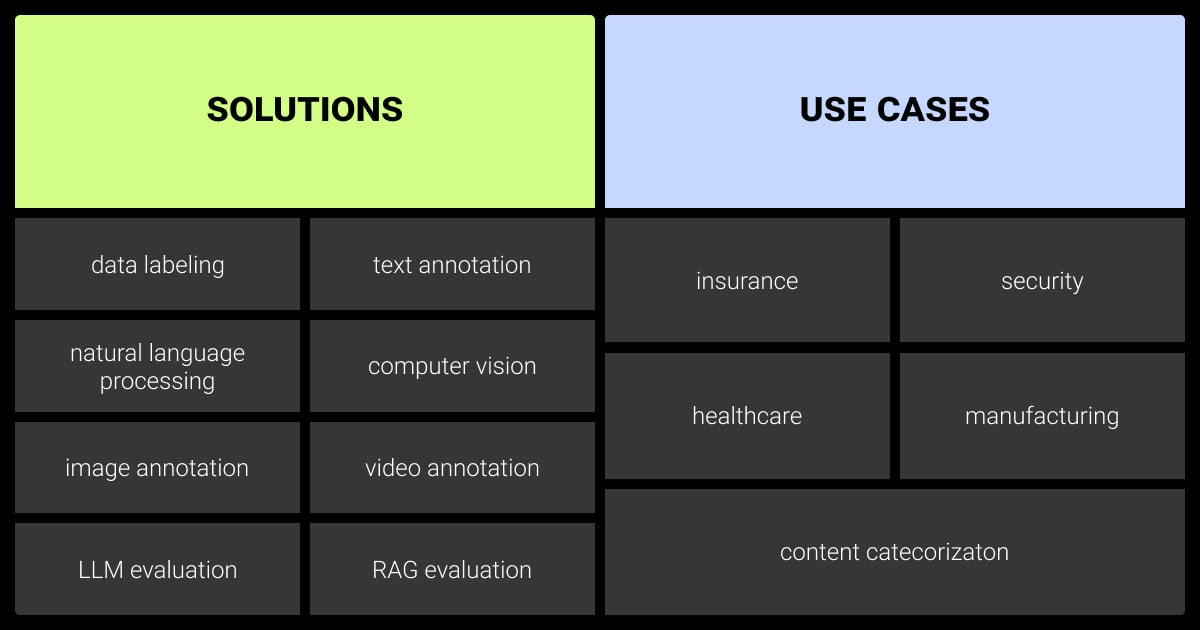
Kili Technology offers versatile data labeling services essential for any ML project, with comprehensive tools tailored to streamline the annotation process based on your specific needs.
Platform-Based Annotation:
Quick Start: Begin annotating data quickly with an intuitive platform.
Customization: Configurable interfaces and pre-annotation using your models expedite labeling.
Quality Assurance: Integrated quality metrics identify and address errors, ensuring high-quality datasets.
Labeling Job Types: Supports classification, object/entity detection, object/entity relation, and transcription.
Process:
Design project-specific interfaces.
Assign data to annotators, set validation rules, and use segmentation/tracking tools.
Pre-label data with model predictions.
Analyze productivity and review critical data points with advanced metrics.
Integration: Seamlessly integrates with Amazon, Google, and Microsoft cloud storage.
Export: Export data in your model’s format and manage access rights with predefined roles.
Automation: API and Python SDK integration for a smooth ML stack connection, with webhooks and plugins for MLOps automation.
Kili Simple Annotation Process:
Data Submission
Project Initialization
Real-Time Monitoring
Delivery
ML Expert Guidance:
Requirement Communication
Feedback Loop
Progress Monitoring
Continuous Improvement
Quality Assurance
CloudFactory QA
CloudFactory ensures highly accurate annotations through a combination of automated checks and human review, boasting a 100% QA guarantee. Here's an overview of their quality assurance process:
Built-in QA: Quality checks are integrated throughout the workflow, as specified by your SLA.
Model Feedback: For computer vision tasks, CloudFactory provides feedback to improve your model, not just the data labeling.
Multi-layered Quality Control:
Gold Standard
Sample Review
Consensus
Intersection over Union (IoU)
Kili Technology QA
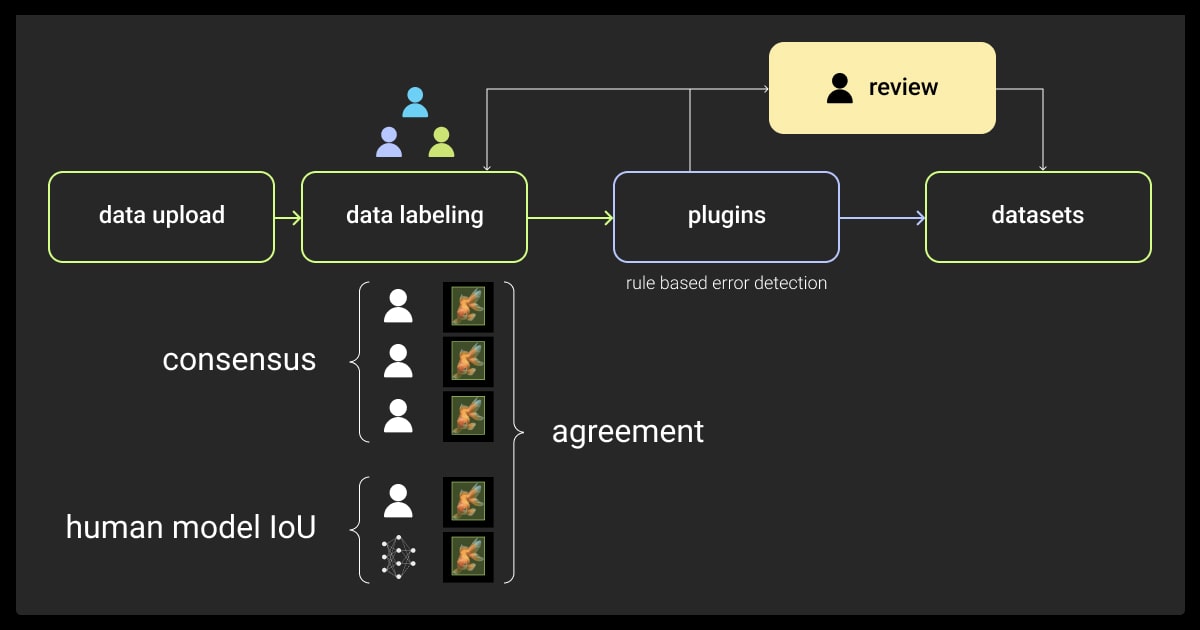
Ensuring high-quality annotations is essential for successful data annotation projects. Kili Technologies offers a range of tools and processes to enhance quality management.
QA Tools and Processes:
Annotation Consistency Checks: Automated checks review consistency across multiple annotators, identifying and resolving discrepancies.
Review and Feedback: Annotations can be reviewed by team members, and feedback is provided in an iterative loop for continuous improvement.
Quality Control Metrics: Metrics such as inter-annotator agreement and annotation speed are used to assess annotator performance and identify areas for improvement.
Kili Technologies guarantees 95% accuracy based on specific project requirements.
Approaches to Data Labeling Quality:
Low-Error Datasets
Data Cleaning
Programmatic QA
Security and Data Compliance
Feature | CloudFactory | Kili Technology |
Access Controls |
|
|
Worker Screening | All workers sign a security agreement and NDA | Comprehensive worker screening process |
Compliance |
|
|
TL;DR
Aspect | CloudFactory Pros | CloudFactory Cons | Kili Technology Pros | Kili Technology Cons |
Services | Flexible pricing Scalable solutions | Limited support for advanced NLP tasks, especially in non-English languages | Global workforce of annotators Professional consulting from ML Engineers | High cost for expert services Limited flexibility in custom workflows and tools |
Tools | User-friendly, flexible integration with existing software | Lacks some advanced features | AI-assisted pre-labeling Integrated quality metrics | Automated features in development Limited video annotation support |
Pricing | Flexible pricing (per object for Computer Vision, per hour for NLP) Pay only for what you use High-volume discounts | Annual agreement with fixed cost billed monthly Specific tools needed for Accelerated Annotation | Free plan for beginners Flexible Grow Plan Custom enterprise pricing | High cost for Professional Services |
QA | Quick turnaround due to efficient processes | Less stringent QA, which might affect accuracy in some cases | Consistency checks and feedback loops 95% accuracy guarantee | Limited integration with existing workflows |
CloudFactory and Kili Technology both excel in providing high-quality data labeling services but cater to different needs. CloudFactory offers scalable HITL solutions and emphasizes a robust global workforce, making it ideal for large-scale computer vision projects. In contrast, Kili Technology provides a versatile platform with strong AI-assisted tools and seamless integration capabilities, making it suitable for diverse data types and detailed quality management.
While CloudFactory’s flexible pricing and comprehensive QA processes ensure accuracy and scalability, Kili’s tiered pricing and advanced annotation tools offer tailored solutions for data scientists seeking precision and efficiency.
But if you need a data labeling vendor that offers:
No commitment
Flexible pricing
Tool-agnostic
Data-compliant
Run a free pilot to put our labeling expertise to the test.
FAQ
What are the primary differences in the services offered by CloudFactory and Kili Technology?
CloudFactory specializes in human-in-the-loop (HITL) solutions for data annotation, focusing mainly on computer vision tasks. The company offers services like accelerated annotation and managed workforce solutions.
Kili Technology, in turn, provides a versatile data labeling platform that supports various data types, including text, images, and videos, with strong AI-assisted tools and seamless API integrations. Kili also emphasizes managed expert labeling services and quality management features to ensure high accuracy in datasets.
How do CloudFactory and Kili Technology handle quality assurance in their data annotation processes?
CloudFactory employs a combination of automated checks and human reviews, including methods like Intersection over Union (IoU) and consensus review, to ensure high-quality annotations. They also provide feedback on improving model performance, particularly for computer vision tasks.
Kili Technology, on the other hand, integrates quality control metrics, annotation consistency checks, and programmatic QA within their platform. Kili's approach includes continuous feedback mechanisms, targeted reviews, and the use of advanced quality metrics to maintain high annotation standards.
What are the pricing models for CloudFactory and Kili Technology, and how do they compare?
CloudFactory offers flexible pricing models, including per-object rates for computer vision tasks, hourly rates for NLP tasks, and fixed-cost yearly agreements billed monthly. Their pricing can be scaled based on the volume of work and specific project needs.
Kili Technology provides tiered pricing plans, including a free plan for up to 5,000 annotations, a pay-as-you-go Grow Plan, and an Enterprise Plan with custom contracts and enterprise-grade data protection. Kili also offers professional services as add-ons, with costs depending on project specifics and complexity.
Written by
Karyna is the CEO of Label Your Data, a company specializing in data labeling solutions for machine learning projects. With a strong background in machine learning, she frequently collaborates with editors to share her expertise through articles, whitepapers, and presentations.

